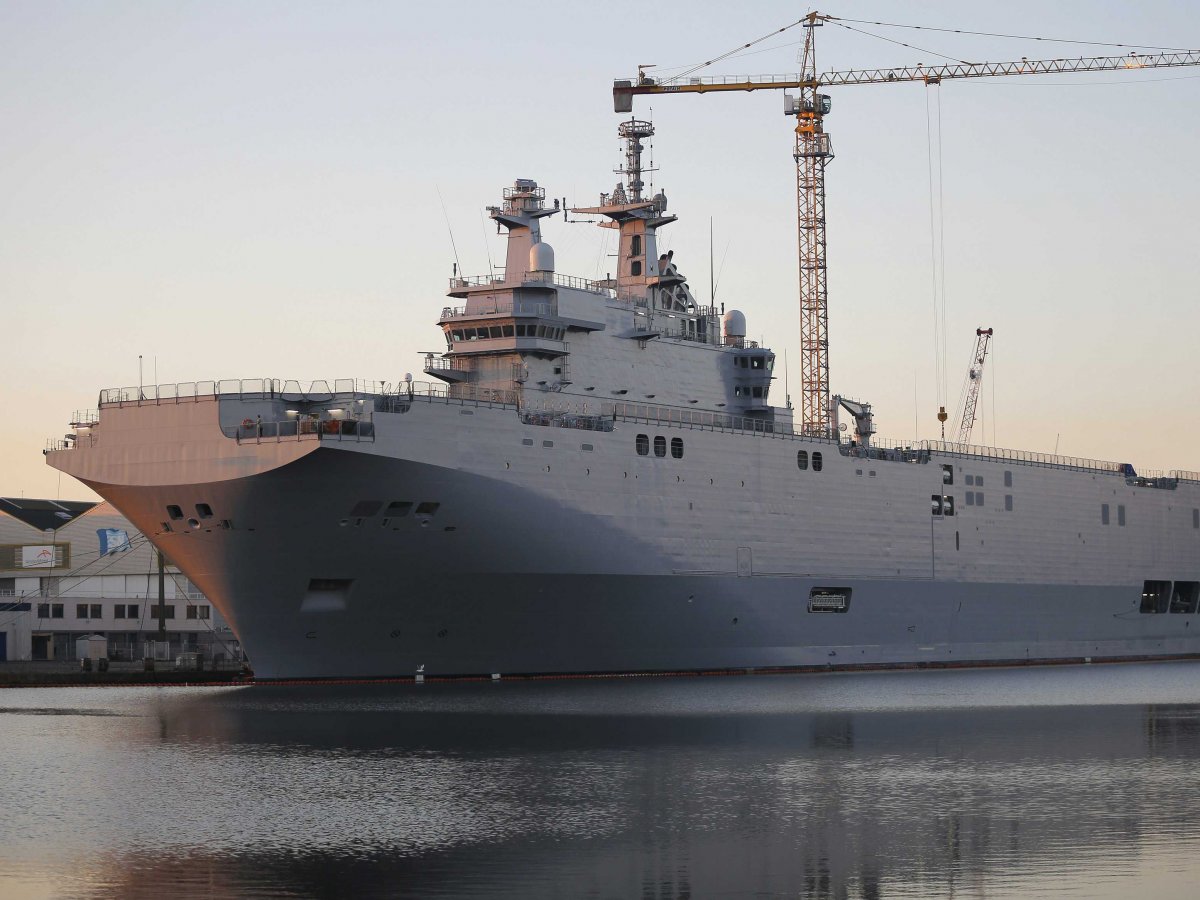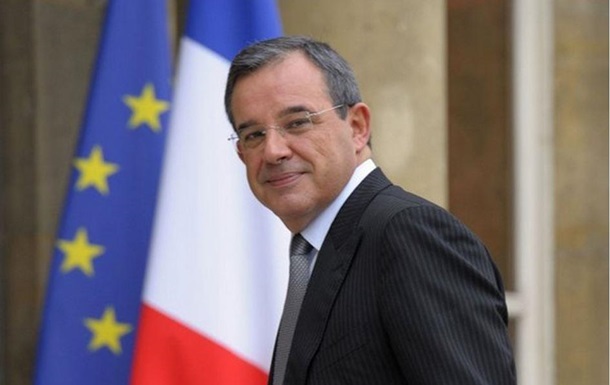By Vincent Jauvert
On June 5th, Francois Hollande invited Barack Obama to dinner at Chiberta on the Champs-Elysees. The atmosphere was warm, fitting for one of the best tables in Paris.
The next day, they were to celebrate the Franco-American partnership on Normandy's beaches. But then, there was a problem. A big problem. The Mistrals - “These f***ing Mistrals,” as one of François Hollande put it - the two French warships that the Kremlin ordered under Sarkozy, and Hollande was set to deliver. One in the coming October, and a second one next year.
“I am deeply concerned," Obama said through pinched lips. "The annexation of Crimea is not a good signal. Why not cancel the deal?”
“Because I do not wish to discard the reputation of France,” replied a very tense Hollande.
“F*** the Mistrals.” On Monday, July 28, an argument broke out in the Elysee, related to the Mistrals again. Eleven days after the downing of a Malaysian Airlines Boeing 777 over Ukraine, the Europeans were meeting in Brussels to enforce new sanctions against Russia. In a thunderous move, Germany asked for a complete halt to arms sales to Moscow, including contracts already signed, which would include the two ships.
The French Minister of foreign affairs, Laurent Fabius, spoke to his German counterpart, Frank-Walter Steinmeier, thundering: "We will not give up." "You will be forced to one day or the other," replied the German, who nevertheless agreed to compromise. Only new arms contracts would be banned. Both Mistrals were saved. For the time being.
"This deal is like a millstone around our neck"
The French victory was fragile. For there were not only America and Germany, but almost all allies of France asking the French Republic to give up on this sale.
“This deal is like a millstone around our neck" said one of the president's closest advisors.
Not since the resumption of nuclear tests in 1995 had Paris been subjected to such international pressure.
With this deal we are constantly on alert, said a senior French official. The attacks are coming from everywhere."
On June 3, the Polish foreign minister said scathing: "When countries seize by force part of their neighbor's territory, it is not the best time to provide them with sophisticated weaponry."
On July 21, David Cameron said that delivering the Mistral was now "unthinkable."
On July 29, the Japanese Defense Minister said it was feared that Russia would use a Mistral against the Kuril Islands. "Stop this sale," he said to his French counterpart Jean-Yves Le Drian.
On July 31, the New York Times, the world's most influential newspaper, published a tough editorial. According to the NYT, "the honor of France" is at stake.
A strategic gamble failed
Small consolation: in Paris, the opposition is silent. And for a good reason! The Mistral contract was negotiated between 2008 and 2011, when the UMP was the party in power. The three tenors of the UMP (right wing party) - Sarkozy, Fillon and Juppe - personally gave the green light to the deal.
Even the UDI (center) is involved, as the initiator of the deal is none other than Herve Morin, the defense minister at that time. "Yes, I initiated the deal and I have no regrets," he says today.
Only Bernard Kouchner, who was then Minister of Foreign Affairs, expresses today a different mood. In the Nouvel Observateur, he says in his typical manner: "We made a mistake, but in good faith."
"I am interested in this ship!"
The French doctor is right. The history of this so controversial sale is that of a strategic bet that Nicolas Sarkozy lost - a case of guilty blindness.
It all started almost six years ago in late October 2008, at the Euronaval Exhibition in Le Bourget. There, the chief of staff of the Russian Navy, Admiral Vysotsky, approached the stand of the DCNS (Naval Construction Directorate) and pointed to a model of the Mistral saying: "I am interested in this ship"
Stupor. Never since 1945 had Moscow bought a warship abroad, much less from a NATO country, the enemy. Why then this sudden and surprising interest?
"Because of the war in Georgia, which took place three months ago," said in Moscow the best independent expert of the Russian army, Alexander Golts, a former Soviet officer. "At the start of the conflict against Tbilisi, the Russian high command had ordered a naval assault on Georgia but the deployment took five days ... and the Marines arrived after the battle. Hence the idea to get as soon as possible a projection and command ship like the Mistral that our shipyards are unable to build. "
In fact, the Mistral is a great tool for today's wars. In the jargon, this is a "PCB", a projection and command ship (bâtiment de projection et de commandement : BPC). Its features make it the most impressive ship in the French fleet after the aircraft carrier Charles de Gaulle. Measuring 199 meters long, it can carry, and quickly deliver hundreds of kilometers, four hundred and fifty troops, six helicopters, seventy armored vehicles, two operating blocks, and a full command center . All this while commanding a fleet of several ships with advanced electronic capacity . In short, "it is a jewel of the French military technology," said a senior officer.
A great advantage for the Russian army
At first, the Russian military-industrial complex was not thrilled by the possibility of such foreign competition. "But we soon realized that the Mistral could deliver a great advantage to the Russian army in certain circumstances," said Ruslan Pukhov, director of a think tank specializing in weapons in Moscow. An example?
Imagine a violent riot against the Russian minority in Estonia. With the Mistral, our navy could be there in a few hours, landing enough troops or helicopters to protect the Russians. "
A scenario reminiscent of what is happening in Ukraine five years later. "Yes, we could have used the Mistral in the Crimea," Pukhov said. In late 2008, when the Russian admiral was interested in the PCB, the French could not - or did not want to - imagine such a bellicose project.
"Despite the war in Georgia, Sarkozy had decided to focus fully on a detente with Moscow," said Pierre Lellouche, then secretary of state for European Affairs. He believed that the then president, Dmitry Medvedev, was a new Gorbachev. "Sarkozy is confident that, as he said to his employees," he will civilize the Russians. "He wants to seduce them, make friends.
Geostrategic bet
At a conference in Munich in February 2009, the head of state startled the assembly more than when he said, just months after the invasion of Russian troops in Georgia:
"A country [like Russia] that has so many demographic problems is not a country that is spontaneously brought to military aggression with its neighbors."
Naivete, cynicism or blindness? Sarkozy is not the only one in the French government who wanted to get closer to Moscow at a rapid pace. His prime minister, François Fillon, who in November 2008 said that "Russia is now a democracy," was also similarly favorable. Among his closest collaborators at Matignon were also two Russian-speaking advisors, Jean de Boishue and Igor Mitrofanof , both very active behind the scenes when it comes to relations with Moscow.
"Everyone wanted to recapture the spirit of the Franco-Russian alliance of 1892," remembers Pierre Lellouche. Especially since he had a great need to catch up on the Russian market, where the Germans and Italians were very far ahead. "The geostrategic bet is confirmed, legitimized by a large shopping appetite …"
Discussions on the sale of PCBs to Russia started in the summer of 2009. But immediately strong opposition appeared among the men in power in Paris. The head of cabinet of the defense minister Hervé Morin, Vice Admiral Païtard, was against providing such equipment and said so. "I agreed to take a step towards the Russians," he recalls today, "but why start with military cooperation, and with sophisticated hardware? Could we propose such a "jewel" to Moscow?"
Catastrophic situation of French shipyards
In late September 2009, the divisions within the state were such that Nicolas Sarkozy met a small board to decide. In the green room of the Elysee, the main players were back there. Two personalities clashed: the defence minister and the military advisor to the President, Admiral Edouard Guillaud.
"I said: take off our Cold War glasses," recalls Hervé Morin. "We can not want to get closer to Russia without trusting Russians. Anyway, their navy is in such a state that a ship more or less will not change the strategic balance."
And then the centrist added that there was the catastrophic situation of the Saint-Nazaire shipyards (property of the Korean STX), the order books are so desperately empty." According to Morin, a refusal to sell to the Russians would have been even more unfair since other countries, Spain and the Netherlands in particular, were offering the same type of vessel.
Then Admiral Guillaud, who like many senior officers, particularly naval officers, was strongly opposed to this sale, said: "The fate of Europe is played partly by Russia. But what do we know about the future of this country? How has she changed in four years, when we will have to deliver this "jewel" of French military technology? Is it not irresponsible to take such a risk for a nation like ours, a permanent member of the Security Council of the UN?"
A question that sounds strange today, five years after .... And then added Guillaud, "what signal would we be launching to our Eastern European friends that we want to build a true European defense with when they still see Russia as their main enemy?"
"The STX shipyard is in big trouble, but why not build a Mistral for the French navy earlier than expected in the military planning law?"
François Fillon jumped: "impossible, it would be too costly to the state." Nicolas Sarkozy agreed with Morin and Fillon.
No technology transfer?
France proposed the PCB to Russia, but promised not to transfer sensitive technology. A position that was not held. Since the announcement of the decision, several capitals expressed their strong opposition and tried - already - to dissuade Paris from selling the Mistral.
Americans were the spokesmen of the Baltic States and Poland. In November 2009, Senator McCain and five of his colleagues wrote to the ambassador of France in Washington. "We fear," they said, "that this sale sends the message that France acquiesces in Russia’s increasingly belligerent and unlawful behaviour ."
In the aftermath, several emissaries of the State Department quietly came to Paris. The Secretary of State for Defence, Robert Gates, was received in February 2010 by Hervé Morin.
The American told him again that "the sale would send the wrong message to Russia and our Central European allies," particularly because of the fact that France was the guarantor of the agreement with Georgia that Moscow was violating. Nothing worked.
During a joint press conference with the Russian Prime Minister at that time, Vladimir Putin, Fillon said that refusing the sale of Mistral would "have been a reaction that had nothing to do with the reality of the situation".
So, on March 1, 2010, for the launch of the Year of Russia in France, Nicolas Sarkozy announced that "exclusive negotiations" on the sale of PCBs had started.
"The Mistral is a symbol of trust between our two countries," Medvedev said during the ceremony.
But behind the scenes, the French military-diplomatic apparatus continued to resist.
Delivering the ship, okay, but naked, that is to say without weapons (there are very few on a Mistral) and especially without electronic equipment.
The Russians are raising the stakes
Obviously, Moscow did not hear it that way. In July 2010, the Chief of Staff of the Russian army, General Makarov, said he wanted "a full-boat, or nothing." The talks were frozen.
To unlock the situation, Nicolas Sarkozy discreetly dispatched his new military adviser, General Puga, to Kaliningrad to meet the real Russian negotiator, Igor Sechin, a close friend of Putin. “We must give in."
So be it, for some sophisticated equipment, including the combat management system Senit 9 with radar and communications developed by Thales. That was not all.
"Because they understood that we absolutely wanted to sell, the Russians were still raising the stakes," says one of those who best know the deal. They asked that starting with the first boat, part of the ship's hull would be built in St. Petersburg and not in Saint-Nazaire. It was a yes again, for the bow.
The Russians wanted more. They required a transfer of technology, not only for technical assembly of the boat, but especially for sensitive electronic systems. This was contrary to the decisions of the Board meeting of September 2009.
But Nicolas Sarkozy, who dreamed of announcing an agreement before the end of the France-Russia year, December 31, again gave in. An agreement of the Interministerial Committee that authorizes arms exports (CIEEMG) is also necessary. The approval may take some time. Especially as the commitee is partly composed of opponents to the sale.
Agreement signed January 25, 2011
Sarkozy found a way to speed things up, an ad hoc-created PCB committee that prepared the agreement by CIEEMG in a very short time. The deal also had to be approved by the Board of Directors of the DCNS (former Directorate Shipyards). It met in special session Dec 13, 2010.
As an extremely rare case, union representatives, those of the CFDT, said that of course the command was "vital" for jobs, but they worried about the "risks generated by a transfer of technology" and abstained during the vote.
Still, the new offer was validated, and on December 24th, Medvedev called Nicolas Sarkozy to announce that since its requests had been accepted, Russia agreed: its navy would buy two Mistrals built in France, and would raise an option on two Russian-made ships.
The coalition agreement was then signed January 25, 2011 by Igor Sechin and Alain Juppe, who replaced Hervé Morin. At the ceremony in Saint-Nazaire, the founder of the UMP proudly declared:
"The Mistral is the most important project of those ever made by Russia and by a Western country in this field."
The commercial contract was ratified in June 17, 2011 in Moscow. Prices of the two Mistral: 1.2 billion euros. Delivery of the first, the "Vladivostok" in October 2014.
Cornered!
Here we are. Everything is ready for this so controversial delivery . The ship was quietly baptized by an Orthodox priest in October.
In February, adjustment works in the naval base of Vladivostok were undertaken to host it. And in late June, four hundred Russian sailors arrived in Saint-Nazaire to train on “Vladivostok”
What will Hollande do in the coming September when it comes to issuing - or not - the final export license and let the ship go to Russia? In the meantime, the French position has been fluctuating.
On March 18, the day when Moscow officially annexed the Crimea, Laurent Fabius said that France "planned" to suspend the sale. But the Ministry of Defence and the Finance Ministry immediately disagreed. And also the Prime Minister, because Saint-Nazaire is the stronghold of Prime Minister Jean-Marc Ayrault.
Credibility of France
We cannot go back, they said all in chorus. They put forward two main arguments.
One: shipyards, still in bad shape, should in the event of cancellation pay a fortune to Moscow for the amounts already received (800 million euros) plus penalties of 251 million.
Two: France would lose its credibility in the defense market.
"The Indians may not buy Rafales, says one to the Ministry of Defence, if they are not sure that we will fulfill entirely the contract."
After several meetings last April, Hollande decided he would resist pressure. Will he hold this position until the end?
"There is no good solution," said a senior official. "Either we deliver the Mistral and we will be accused of complicity with Putin, or we do not deliver the Mistral and France will be said to have bowed to the United States." It remains to be seen which is the least damaging.
[hr]Source: Le Nouvel Observateur, translated by Fren Chud, edited by Edmond Huet & Michael Garrood





